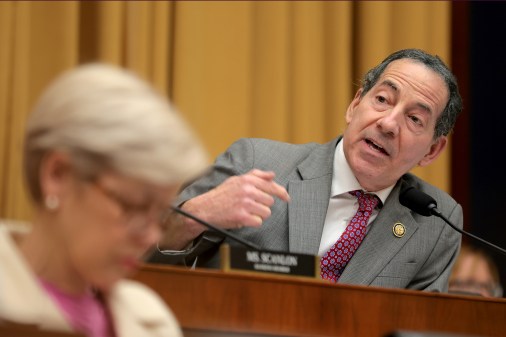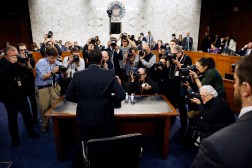House passes extension of expiring surveillance authorities

The wild and woolly debate over a powerful but divisive surveillance tool got even wilder Friday when the House of Representatives, in an about-face from two days ago when former President Donald Trump had mobilized his allies to scuttle the law, passed a measure to extend the expiring authorities.
To make matters wilder still, a rare tie vote defeated an amendment that civil liberties and privacy groups had fought hard to include. That amendment would have required a warrant to query data collected under the law on American citizens and organizations, as well as people on U.S. soil.
Legislation renewing the authorities under Section 702 of the Foreign Intelligence Surveillance Act now moves to the Senate after decisive passage in the House by a vote of 273-147.
Friday’s vote marks a major victory for the Biden administration, which had lobbied aggressively against the warrant requirement and to renew the measure. It also marks the culmination of a protracted debate in the House that has made unlikely bedfellows of progressive lawmakers, longtime conservative opponents of the measure and allies of Trump. The former president has argued, incorrectly, that Section 702 was used to surveil his presidential campaign.
Writing on the social media platform Truth Social earlier this week, Trump urged lawmakers to “kill FISA.” Subsequently, 19 Republicans to join with Democrats to block debate on renewing the law.
Between Wednesday’s vote and Friday’s passage of the measure, lawmakers scaled back when the law would need to be renewed — from five years to two — and worked to get Trump on board with the measure.
“There have been some conversations with the president, and I am not going to share those conversations, but I think the two-year sunset has a lot of appeal to a lot of people,” House Majority Leader Steve Scalise, R-La., told reporters, referring to Trump.
A two-year extension would push renewal efforts to earlier in the term of the winner of this fall’s presidential election, rather than toward its end. If Trump wins in November, he would have a shot at rewriting a measure that he has used as a cudgel in his attacks against the FBI and other elements of the so-called “deep state” that he views as arrayed against him.
The measure now heads to the Senate. Observers believe the upper chamber is likely to approve the measure, but passage is not guaranteed. Sen. Ron Wyden, D-Ore., said on Friday that he would “do everything in my power to stop this bill,” which he described as “one of the most dramatic and terrifying expansions of government surveillance authority in history.”in November, he would have a shot at reforming a measure that he has used as a cudgel in his attacks against the FBI and other elements of the so-called “deep state” that he views as arrayed against him.
The measure now heads to the Senate. Observers believe the upper chamber is likely to approve the measure, but passage is not guaranteed. Sen. Ron Wyden, D-Ore., said on Friday that he would “do everything in my power to stop this bill,” which he described as “one of the most dramatic and terrifying expansions of government surveillance authority in history.”
While Section 702 targets foreigners for mass warrantless surveillance, that eavesdropping can include foreigners speaking to people in the United States. A major question before lawmakers Friday was whether to require a warrant when searching the system using U.S. person identifiers, like a phone number or email address.
That provision of the law has been widely abused to carry out searches of Black Lives Matter protesters, U.S. politicians and political donors. The backers of the warrant requirement saw the measure as essential in protecting Americans against improper searches. Without a warrant, spy agencies “will go on breaking the law and violating American rights in the process,” said New York Rep. Jerrold Nadler, the top Democrat on the House Judiciary Committee.
House Intelligence Committee Chairman Mike Turner, R-Ohio, said a warrant requirement would make it easier for terrorists to recruit within the United States. “This is dangerous,” he said of the amendment. “This will make us go blind.”
The amendment ultimately fell on a 212-212 vote.
While lawmakers might have voted to scale back the length of the renewal, they moved to expand the law in other ways.
One amendment adopted Friday would broaden the definition of an “electronic communication service provider” that must provide data to the U.S. government under Section 702, a move that civil libertarians have described as a cloaked effort to vastly expand the communications that can be hoovered up under the law.
Turner authored that amendment but said a full discussion of what it is trying to achieve couldn’t happen in public because of classification issues. “This amendment is to correct a technical issue that was found by the FISA court with respect to critical intelligence and a technological issue in which there was a gap,” he said.
Opponents of the amendment, such as Rep. Andy Biggs, R-Ariz., contended that it would “drastically” expand the list of companies that would have to assist in government surveillance, like department stores and laundromats.
Another amendment the House adopted, by a vote of 227-193, would enable procedures under Section 702 for the vetting of non-U.S. persons entering the country.
“We have to allow our national security professionals to have the best information possible to keep Americans safe,” said amendment sponsor Rep. Mike Waltz, R-Fla., citing the threat of Chinese nationals and others.
House Judiciary Chairman Jim Jordan, R-Ohio, scoffed at the prospective expansion of Section 702 that the amendment would permit. “Pretty soon it’s going to be anybody can be searched for any reason at all,” he said.
The Section 702 authorities are currently set to expire by April 19.





